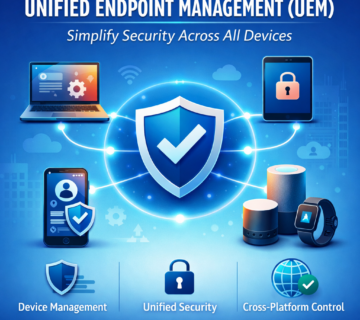The Dawn of AI-Powered Cyber Threats: PromptLock Ransomware Marks a New Era in Malware Evolution
🎙️ Dive Deeper with Our Podcast!
PromptLock: The Dawn of AI Ransomware Threats
👉 Listen to the Episode: https://technijian.com/podcast/promptlock-the-dawn-of-ai-ransomware-threats/
The cybersecurity landscape has witnessed a groundbreaking development that signals a significant shift in how malicious actors approach ransomware design. Security researchers have uncovered PromptLock, the first documented ransomware variant that harnesses artificial intelligence to execute its malicious operations across multiple operating systems.
Understanding PromptLock: A Revolutionary Approach to Ransomware
PromptLock represents a paradigm shift in ransomware development, utilizing machine learning capabilities to generate malicious code dynamically. Unlike traditional ransomware that relies on pre-written scripts, this sophisticated threat leverages the power of large language models to create adaptive attack strategies in real-time.
The malware specifically employs OpenAI’s gpt-oss:20b model through the Ollama API, demonstrating how cybercriminals are beginning to weaponize publicly available AI technologies for nefarious purposes. This approach allows the ransomware to generate Lua scripts on-demand, making it particularly challenging for security solutions to detect and prevent.
Technical Architecture and Operational Mechanics
Core Infrastructure
PromptLock’s foundation rests on a Golang framework that communicates with remote AI servers through proxy tunnels. This architecture provides the malware with several operational advantages, including enhanced stealth capabilities and the ability to adapt its behavior based on the target environment.
The ransomware maintains connectivity to a remote server hosting the large language model, establishing a communication channel that enables dynamic script generation throughout the attack lifecycle. This server-client relationship allows the malware to remain lightweight while accessing powerful AI capabilities when needed.
Dynamic Script Generation Process
The malware operates through a sophisticated prompt-based system where pre-programmed instructions guide the AI model to generate specific types of malicious code. These prompts cover various attack phases, including system reconnaissance, file identification, data extraction, and encryption procedures.
The AI-generated Lua scripts perform critical functions such as local filesystem enumeration, enabling the malware to map the target system comprehensively. Additionally, these scripts conduct thorough inspections of target files, determining which data should be prioritized for encryption or exfiltration based on predefined criteria.
Multi-Platform Compatibility and Cross-System Threats
Universal Operating System Support
One of PromptLock’s most concerning characteristics is its ability to operate across Windows, macOS, and Linux environments. This cross-platform compatibility significantly expands its potential target base and demonstrates the versatility that AI-powered malware can achieve.
The universal nature of this threat stems from its reliance on AI-generated scripts rather than platform-specific executables. By generating appropriate code for each operating system dynamically, PromptLock can adapt its attack methodology to exploit system-specific vulnerabilities and characteristics.
Encryption and Data Handling Mechanisms
The ransomware employs the SPECK 128-bit encryption algorithm, an unconventional choice that reflects its experimental nature. This lightweight cipher, typically reserved for RFID applications, suggests that PromptLock prioritizes operational efficiency over maximum security strength.
Data exfiltration capabilities allow the malware to steal sensitive information before encryption, following the double extortion model that has become increasingly common among modern ransomware operations. This approach increases pressure on victims by threatening both data accessibility and confidentiality.
Current Threat Assessment and Real-World Impact
Proof of Concept Status
Security researchers emphasize that PromptLock currently exists as a demonstration tool rather than an active threat in cybercriminal ecosystems. Several indicators support this assessment, including the use of weak encryption standards, placeholder Bitcoin addresses, and incomplete feature implementations.
The malware’s appearance on VirusTotal without corresponding detections in security telemetry systems further reinforces its experimental status. However, this proof-of-concept nature should not diminish concerns about its implications for future threat development.
Industry Response and Discovery
Following public disclosure of PromptLock’s capabilities, a security researcher claimed responsibility for the project, stating that the malware had been leaked without authorization. This revelation highlights the potential risks associated with AI-powered security research and the importance of responsible disclosure practices.
The cybersecurity community’s response has focused on understanding the technical implications and developing appropriate detection mechanisms. Security vendors are actively analyzing the malware’s behavior patterns to enhance their protection capabilities against similar threats.
Broader Implications for Cybersecurity
Lowering Criminal Entry Barriers
PromptLock’s AI-powered approach potentially reduces the technical expertise required to develop sophisticated malware. By automating complex coding tasks, such systems could enable less skilled actors to create and deploy advanced threats.
This democratization of malware development capabilities represents a significant concern for the cybersecurity community, as it may lead to increased attack volumes and more diverse threat actors entering the criminal ecosystem.
Operational Flexibility and Evasion Capabilities
AI-generated malware offers enhanced evasion capabilities by producing unique code variations for each deployment. This dynamic approach makes signature-based detection methods less effective and forces security solutions to adopt more sophisticated behavioral analysis techniques.
The operational flexibility provided by AI integration allows malware to adapt its behavior based on target characteristics, system configurations, and defensive measures encountered during execution.
Related Developments in AI-Powered Malware
LameHug Malware Campaign
The emergence of LameHug malware in July demonstrated that PromptLock is not an isolated development. This threat, attributed to Russian APT28 hackers, utilizes Hugging Face API and Alibaba’s Qwen-2.5-Coder-32B model to generate Windows shell commands dynamically.
LameHug’s deployment in active cyber operations shows that AI-powered malware has moved beyond theoretical concepts to practical implementation by sophisticated threat actors. This progression indicates that the cybersecurity community must prepare for broader adoption of AI technologies in malicious applications.
Evolution of Threat Landscapes
These developments signal a fundamental shift in how cybercriminals approach malware development. The integration of AI capabilities enables more adaptive, resilient, and sophisticated attack methodologies that challenge traditional security paradigms.
Security professionals must evolve their defensive strategies to address these emerging threats effectively, incorporating AI-powered detection and response capabilities to counter AI-enhanced attacks.
Frequently Asked Questions
What makes PromptLock different from traditional ransomware?
PromptLock distinguishes itself by using artificial intelligence to generate malicious code dynamically, rather than relying on pre-written scripts. This approach provides enhanced flexibility, cross-platform compatibility, and potential evasion capabilities that traditional ransomware lacks.
Is PromptLock currently active in the wild?
No, security researchers classify PromptLock as a proof-of-concept or demonstration tool. It has not appeared in active threat telemetry systems and contains several indicators suggesting experimental rather than operational status.
How does AI integration benefit malware operators?
AI integration provides malware with dynamic code generation capabilities, cross-platform compatibility, enhanced evasion potential, and reduced technical barriers for threat actors. These advantages make AI-powered malware particularly concerning for cybersecurity professionals.
What operating systems does PromptLock target?
PromptLock demonstrates cross-platform capabilities, targeting Windows, macOS, and Linux systems through its AI-generated Lua scripts that adapt to different operating environments.
Are there other examples of AI-powered malware?
Yes, LameHug malware represents another example of AI-powered threats. This malware, attributed to Russian APT28 hackers, uses large language models to generate Windows shell commands for cyber operations.
What encryption method does PromptLock use?
PromptLock employs the SPECK 128-bit encryption algorithm, which is considered relatively weak and typically used for RFID applications rather than robust data encryption.
How can organizations prepare for AI-powered malware threats?
Organizations should enhance their behavioral analysis capabilities, implement advanced threat detection systems, maintain updated security awareness programs, and develop incident response procedures specifically addressing AI-enhanced threats.
What are the implications for the broader cybersecurity industry?
AI-powered malware represents a significant evolution in threat capabilities, potentially lowering entry barriers for cybercriminals while increasing attack sophistication. This development necessitates corresponding advances in defensive technologies and strategies.
How Technijian Can Help Protect Your Organization
At Technijian, we understand that emerging threats like AI-powered ransomware require specialized expertise and cutting-edge defensive strategies. Our cybersecurity team provides comprehensive protection services designed to address both current and evolving threat landscapes.
Our advanced threat detection systems incorporate machine learning algorithms specifically designed to identify AI-generated malware behaviors, ensuring your organization stays protected against sophisticated attacks like PromptLock and similar variants. We continuously monitor threat intelligence feeds and update our defensive capabilities to address emerging AI-powered threats.
Technijian offers specialized incident response services for organizations facing advanced persistent threats, including AI-enhanced malware attacks. Our skilled team swiftly contains threats, conducts detailed forensic investigations, and supports full recovery efforts to reduce business disruption and safeguard critical data.
Through our managed security services, we implement multi-layered defense strategies that combine traditional security measures with AI-powered threat detection capabilities. This approach ensures comprehensive protection against both conventional and emerging cyber threats.
Our cybersecurity awareness training programs educate your staff about AI-powered threats and social engineering tactics used by modern cybercriminals. We believe that informed employees represent your strongest defense against sophisticated attack methods.
Contact Technijian today to schedule a comprehensive security assessment and learn how our expert team can protect your organization against the evolving landscape of AI-powered cyber threats. Our proactive approach ensures that your business remains secure while maintaining operational efficiency and productivity.
About Technijian
Technijian is a premier managed IT services provider, committed to delivering innovative technology solutions that empower businesses across Southern California. Headquartered in Irvine, we offer robust IT support and comprehensive managed IT services tailored to meet the unique needs of organizations of all sizes. Our expertise spans key cities like Aliso Viejo, Anaheim, Brea, Buena Park, Costa Mesa, Cypress, Dana Point, Fountain Valley, Fullerton, Garden Grove, and many more. Our focus is on creating secure, scalable, and streamlined IT environments that drive operational success.
As a trusted IT partner, we prioritize aligning technology with business objectives through personalized IT consulting services. Our extensive expertise covers IT infrastructure management, IT outsourcing, and proactive cybersecurity solutions. From managed IT services in Anaheim to dynamic IT support in Laguna Beach, Mission Viejo, and San Clemente, we work tirelessly to ensure our clients can focus on business growth while we manage their technology needs efficiently.
At Technijian, we provide a suite of flexible IT solutions designed to enhance performance, protect sensitive data, and strengthen cybersecurity. Our services include cloud computing, network management, IT systems management, and disaster recovery planning. We extend our dedicated support across Orange, Rancho Santa Margarita, Santa Ana, and Westminster, ensuring businesses stay adaptable and future-ready in a rapidly evolving digital landscape.
Our proactive approach to IT management also includes help desk support, cybersecurity services, and customized IT consulting for a wide range of industries. We proudly serve businesses in Laguna Hills, Newport Beach, Tustin, Huntington Beach, and Yorba Linda. Our expertise in IT infrastructure services, cloud solutions, and system management makes us the go-to technology partner for businesses seeking reliability and growth.
Partnering with Technijian means gaining a strategic ally dedicated to optimizing your IT infrastructure. Experience the Technijian Advantage with our innovative IT support services, expert IT consulting, and reliable managed IT services in Irvine. We proudly serve clients across Irvine, Orange County, and the wider Southern California region, helping businesses stay secure, efficient, and competitive in today’s digital-first world.





